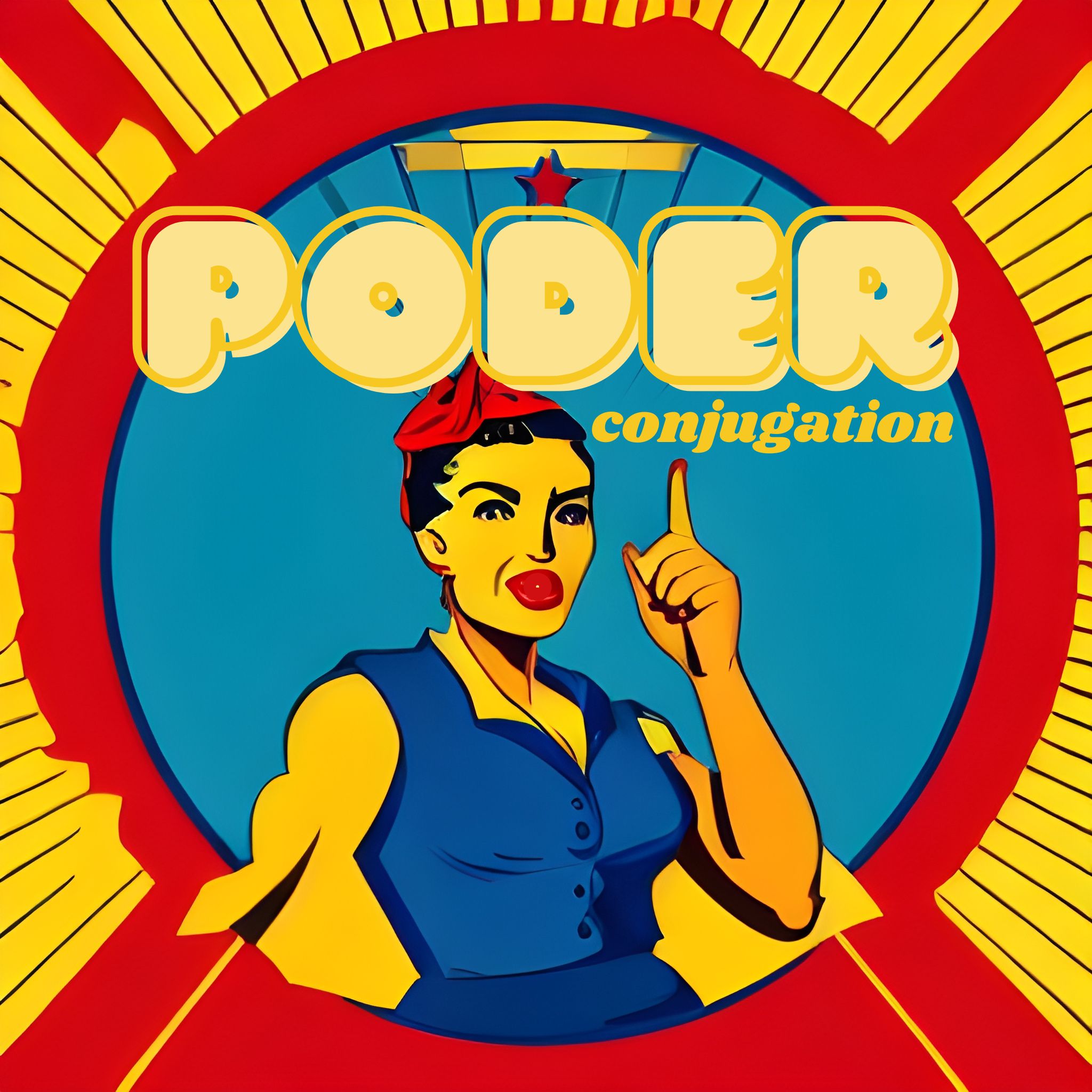Poder conjugation: A complete guide to the conjugation of Poder

Get our free email course, Shortcut to Conversational.
Have conversations faster, understand people when they speak fast, and other tested tips to learn faster.
More infoPoder is one of the most common verbs in the Spanish language. Whether you want to use it in everyday conversation, or in written Spanish, it’s vital to have a good grasp of poder conjugation in a number of different tenses.
In this post we give you the conjugation of poder in all the Spanish tenses. We’ll start off with an introduction of poder meanings, and then get straight into our poder conjugations. We’ll break it down by mood, providing a full poder conjugation chart for each and every tense.
Poder is an irregular -er verb with a u to ue stem change. By the end you’ll know your poder conjugation enough to practice with a set of exercises. ¡Seguramente podrás hacerlo! – We bet you’ll be able to do it!
Poder meanings
Let’s start off with a quick intro to the main meanings of poder in Spanish.
The most common translation of poder is to be able to or can. The conjugated form of poder is followed by the infinitive of the other verb that the subject is able to do:
- Mi hermano y yo podemos pelear durante horas. – My brother and I can fight for hours.
- Juana nunca podía salir con sus amigas. – Juana was never able to go out with her friends.
Poder is also be used to talk about capacities or abilities. Again, the conjugated poder forms are followed by infinitives of the verb describing what the subject is capable of.
- Durante su juventud podía correr 10 millas todos los días. – During his youth he was able to run 10 miles every day.
- Pedro puede quedarse 3 minutos bajo el agua. – Pedro can remain 3 minutes underwater.
Finally, poder is frequently used to ask for and to grant permission, again with an infinitive stating the action that the subject can do or may do:
- Martín le dijo a su hijo que podía ir a la disco esa noche. – Martín told his son that he could go to the disco that night.
- ¿Puedo hacer una pregunta? – May I ask a question?
Poder Conjugation
We’ll spend the rest of the post introducing each and every poder conjugation, with tons of examples to demonstrate each tense.
Just keep in mind what we saw in the previous section, where we explained that the conjugated forms of poder are nearly always followed by another verb in the infinitive.
Check out our detailed post on the Spanish infinitive where we go into this practice and more. For each of the individual moods and tenses, we provide additional links to our other dedicated posts that explain each one in more detail. For a full overview, we can even recommend our big post on all the verb tenses in Spanish!
Now let’s get into our main section on poder conjugation, broken down by mood and tense!
Indicative mood
We use the indicative mood to refer to facts or states which are certain and concrete. In this section we’ll present all the tenses used in the indicative mood: present, preterite, imperfect, conditional, future, and all the perfect forms of the verb poder.
Poder present conjugation
Note the stem change to pue- in all forms except for nosotros, which remains pod-. Poder in present tense is often simply translated as can or may.
| Personal pronoun | Poder conjugation present tense |
| Yo | puedo |
| Tú | puedes |
| Él, Ella, Usted | puede |
| Nosotros, Nosotras | podemos |
| Ellos, Ellas, Ustedes | pueden |
- Los niños no pueden beber alcohol. – Kids may not drink alcohol.
- Yo puedo compartir este secreto contigo. – I can share this secret with you.
- ¿Podemos hablar un minuto? – Can we talk for a moment?
Fun fact: This present nosotros conjugation of poder has been adopted as the name of a political party in Spain: Podemos means we can.
Check out our other posts for more details on the simple present tense, or for more stem-changing verbs.
Poder conjugation preterite
The preterite stem of poder is pud-. Poder in preterite can be translated into English as was able to, were able to, and could.
| Personal pronouns | Poder preterite tense conjugation |
| Yo | pude |
| Tú | pudiste |
| Él, Ella, Usted | pudo |
| Nosotros, Nosotras | pudimos |
| Ellos, Ellas, Ustedes | pudieron |
- La semana pasada Julia no pudo ir a la fiesta. – Last week, Julia couldn’t go to the party.
- ¿Pudieron hablar español en Puerto Rico? – Were you guys able to speak Spanish in Puerto Rico?
- No pudimos dormir en el tren. – We couldn’t sleep on the train.
For more on this tense, check out our post on how to master the Spanish preterite in minutes.
Poder imperfect conjugation
For the imperfect past conjugation of poder, the stem remains pod-. Poder imperfect translations in English are again usually expressed with was able to, were able to, and could.
| Personal pronoun | Poder imperfect conjugation |
| Yo | podía |
| Tú | podías |
| Él, Ella, Usted | podía |
| Nosotros, Nosotras | podíamos |
| Ellos, Ellas, Ustedes | podían |
- Cuando éramos niños no podíamos caminar muchas horas. – When we were kids we were’t able to walk for many hours.
- Marcelo podía estar todo el día durmiendo. – Marcelo was able to sleep all day long.
- En esa época, yo podía comprar todo lo que quisiera. – In those times, I was able to buy whatever I wanted to.
Since the English translations are often similar, this form of poder in past tense is often confused with the preterite. To keep the two clear, check out our anti-confusion guide to preterite vs imperfect tenses. For more on this particular tense, go to our beginner’s guide to the Spanish imperfect tense.
Poder conditional tense
Note that the conditional conjugation is very similar to the imperfect, but with an additional -r- in all the conjugated forms. This conditional form of poder is translated as could in English.
| Personal pronouns | Poder conjugation conditional |
| Yo | podría |
| Tú | podrías |
| Él, Ella, Usted | podría |
| Nosotros, Nosotras | podríamos |
| Ellos, Ellas, Ustedes | podrían |
- Si viviéramos en Buenos Aires, podríamos bailar tango cada día. – If we lived in Buenos Aires, we could dance tango every day.
- ¿Podrías prestarme dinero hoy? – Could you lend me some money today?
- Podríamos ir adonde tú quieras. – We could go wherever you would like.
Check out our beginner’s guide to conditional Spanish for more on this tense, including a comparison of podría meaning could, debería for should, and other conditional forms for would.
Poder future tense
Whereas regular verbs form the simple future tense by adding the endings onto the infinitive, the poder future tense stem is actually podr-. The endings are nonetheless the same as regular verbs.
The poder future tense conjugation is translated into English just like any other verb, by adding the auxiliary will to the infinitive: will be able to.
| Personal pronouns | Poder future conjugation |
| Yo | podré |
| Tú | podrás |
| Él, Ella, Usted | podrá |
| Nosotros, Nosotras | podremos |
| Ellos, Ellas, Ustedes | podrán |
- Podrán cocinar solo si tienen todos los ingredientes. – They’ll be able to cook only if they have all the ingredients.
- Podremos ir, solo si ustedes pagan. – We will be able to go only if you pay.
- No sé si podré hacerlo hoy. – I don’t know if I will be able to do it today.
Check out our post on future tense Spanish for details on the simple future tense and more.
Compound tenses
Here we present you with the poder conjugation chart for the perfect forms. These compound indicative tenses of poder are all formed by conjugating the auxiliary verb haber and adding the poder past participle.
As you can see here, the past participle of poder is podido.
When used in progressive tenses, the gerund of poder is pudiendo.
| Personal pronouns | Present perfect | Past perfect | Perfect future | Perfect conditional |
| Yo | he podido | había podido | habrá podido | habría podido |
| Tú | has podido | habías podido | habrás podido | habrías podido |
| Él, Ella, Usted | ha podido | había podido | habrá podido | habría podido |
| Nosotros, Nosotras | hemos podido | habíamos podido | habremos podido | habríamos podido |
| Ellos, Ellas, Ustedes | han podido | habían podido | habrán podido | habrían podido |
- Hemos podido pagar nuestras cuentas desde 1999. – We’ve been able to pay our bills since 1999.
- Cuando llegó Mirta, yo ya me había podido escapar. – When Mirta arrived, I had already been able to escape.
- Para enero ya habré podido graduarme. – By January I will have been able to graduate.
- Si hubieras tenido tiempo, habrías podido estudiar para el examen. – If you had had time, you would have been able to study for the exam.
For explanations on each these indicative perfect tenses, check out our dedicated posts on present perfect Spanish, past perfect Spanish, future perfect Spanish, and the Spanish conditional, We also have a related post on the Spanish past participle, and another on the auxiliary verb haber in our post comparing haber vs tener.
Subjunctive mood
Although the English subjunctive is not very common, it’s used all the time in Spanish. In short, the subjunctive in Spanish is generally used to express uncertainty, expressions of judgment, possibility, necessity, desire, and doubt. For a full discussion on the Spanish subjunctive mood, we’ll recommend our post on the Spanish subjunctive simplified for beginners.
But for now, let’s stay focused and get through the different poder subjunctive conjugations.
Poder present subjunctive
The present subjunctive conjugation is easy if you know the present indicative forms, since we just exchange the -e for -a in all the endings.
| Personal pronoun | Poder conjugation subjunctive |
| Yo | pueda |
| Tú | puedas |
| Él, Ella, Usted | pueda |
| Nosotros, Nosotras | podamos |
| Ellos, Ellas, Ustedes | puedan |
- Ojalá podamos ganar la lotería. – I wish we could win the lotery.
- No creo que puedas nadar 5 millas con este clima. – I don’t think you’d be able to swim 5 miles in this weather.
- Tal vez nunca pueda volver a comer pescado. – Maybe I’ll never be able to eat fish again.
For more on this tense, see our post on present subjunctive Spanish. We also have a post specifically on the subjunctive trigger word ojalá that we saw in the first example above.
Poder imperfect subjunctive
The stem for poder in imperfect subjunctive is pud-. Note that there are two correct forms for imperfect subjunctive conjugations, so we’ve included both here.
| Personal pronoun | Poder imperfect subjunctive |
| Yo | pudiera / pudiese |
| Tú | pudieras / pudieses |
| Él, Ella, Usted | pudiera / pudiese |
| Nosotros, Nosotras | pudiéramos / pudiésemos |
| Ellos, Ellas, Ustedes | pudieran / pudiesen |
- Si tan solo pudiera recordar la contraseña. – If only I couId remember the password.
- Si pudiéramos irnos de vacaciones, lo haríamos. – If we could go on vacation, we would.
- Si Tomi pudiera hablar español, viajaría a Uruguay. – If Tomi could speak Spanish, he would travel to Uruguay.
Check our post on the Spanish imperfect subjunctive for an in-depth explanation of this tense.
Poder future subjunctive
Just like for imperfect subjunctive, the stem for poder in future subjunctive is pud-.
| Personal pronoun | Poder future subjunctive |
| Yo | pudiere |
| Tú | pudieres |
| Él, Ella, Usted | pudiere |
| Nosotros, Nosotras | pudiéremos |
| Ellos, Ellas, Ustedes | pudieren |
- La agencia recaudadora de impuestos pudiere cobrarlos en cualquier momento. – The tax collection agency may collect the taxes at any moment.
- La participación de los niños no es tan común como se pudiere pensar. – Children’s participation is not as common as some may think.
- Estrictas leyes serán aplicadas, aun cuando la gente no pudiere cumplirlas. – Strict laws will be enforced, even when people may not be able to comply with them.
Compound poder subjunctive conjugation
Just like we saw with the compound conjugations in the indicative mood, the perfect forms in subjunctive also take a conjugated form of the auxiliary verb haber along with the past participle. Again, the past participle of poder is podido.
| Personal pronoun | Perfect subjunctive | Pluperfect subjunctive |
| Yo | haya podido | hubiera / hubiese podido |
| Tú | hayas podido | hubieras / hubieses podido |
| Él, Ella, Usted | haya podido | hubiera / hubiese podido |
| Nosotros, Nosotras | hayamos podido | hubiéramos / hubiésemos podido |
| Ellos, Ellas, Ustedes | hayan podido | hubieran / hubiesen podido |
- Es extraño que no hayan podido cantar esa canción tan fácil. – It’s weird they hadn’t been able to sing such an easy song.
- Esperamos que no hayan podido encontrar la trampa. – We hope they hadn’t been able to find the trap.
- Matías hubiera podido llegar a horario si no hubiera perdido la cartera. – Matías could have arrived on time if he hadn’t lost his wallet.
- Si no hubieses podido caminar, te dolería la cabeza. – If you hadn’t been able to walk, you would have a headache.
Imperative mood
The imperative mood is used to create the command form of verbs. In this case, we never use poder in the imperative because we can’t really order someone to be able to do something or to have an ability. It sounds really weird!
Nonetheless, the poder imperative conjugation exists, so we’ll include it here for completeness.
| Personal pronoun | poder imperative |
| [Tú] | puede |
| [Usted] | pueda |
| [Nosotros, Nosotras] | podamos |
| [Ustedes] | puedan |
For more about this bossy mood, take a look at our post on Spanish commands: the imperative mood made simple.
Conclusion
In this post on poder conjugation, we’ve provided full conjugations for every single Spanish tense, with several examples to demonstrate each one.
We started off with the basic definition of poder, which generally translates into English as to be able to, to be permitted to, or to have the ability to. In certain conjugations, it also often becomes can, could, or may.
As far as usage goes, we learned that conjugated forms of poder are always followed by an infinitive of whatever verb the subject is able to do. This was seen in every single example sentence of throughout the post, regardless of the tense. We also saw that poder isn’t really used in the command form, even though the conjugations exist.
We saw that poder is an irregular stem-changing verb, exhibiting an o to ue change in the indicative present tense. We then provided a poder conjugation chart for each and every Spanish tense, along with links to our dedicated posts explaining each tense in more depth. For a broader overview, we can even send you to our big post covering all the Spanish verb tenses!
You’ve now seen all the poder conjugations, and you have a solid reference to come back to whenever you want to check the Spanish poder conjugation for a given tense.
Poder conjugation exercises
With that, we’ll leave you with a quick set of exercises to see how well you’ve learned your poder verb conjugation. Let’s see what you can do… – Veamos qué puedes hacer…
Just provide the correct conjugation for poder according to the mood and tense in parentheses. The answers and translations are below.
1. Yo _____ nadar. (indicative: present)
2. Ustedes _____ hacer esto durante muchos años. (indicative: present perfect)
3. Felicitas se _____ graduar en 1995. (indicative: preterite)
4. Florencia y Mateo _____ hablar en dos idiomas a la vez. (indicative: imperfect)
5. ¿Nosotros _____ caminar por la playa hoy? (indicative: conditional)
6. Los niños _____ usar la realidad virtual en el colegio el año próximo. (inidicative: future)
7. ¿Ellos _____ sacar a pasear al perro hoy? (indicative: present perfect)
8. Ojalá yo _____ comprar esa casa pronto. (subjunctive: present)
9. Si Romina _____ venir a la playa, tomaría mucho sol. (subjunctive: imperfect)
10. Si yo _____, lo habría hecho antes. (subjunctive: pluperfect)
Answers
1. Yo puedo nadar. – I can swim.
2. Ustedes han podido hacer esto durante muchos años. – You’ve been able to do this for many years.
3. Felicitas se pudo graduar en 1995. – Felicitas was able to graduate in 1995.
4. Florencia y Mateo podían hablar en dos idiomas a la vez. – Florencia and Mateo were able to speak two languages at the same time.
5. ¿Nosotros podríamos caminar por la playa hoy? – Could we walk on the beach today?
6. Los niños podrán usar la realidad virtual en el colegio el año próximo. – The kids will be able to use virtual reality at school next year.
7. ¿Ellos han podido sacar a pasear al perro hoy? – Have they been able to walk the dog today?
8. Ojalá yo pueda comprar esa casa pronto. – I wish I could buy that house soon.
9. Si Romina pudiera venir a la playa, tomaría mucho sol. – If Romina were able to come to the beach, she’d sunbathe a lot.
10. Si hubiera podido, lo habría hecho antes. – If I had been able to, I would have done it before.



